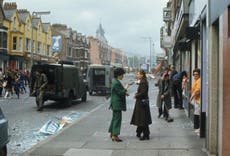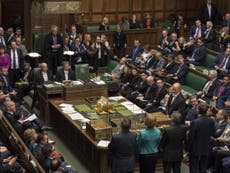We should welcome the tortuous Brexit debate – better that than fighting in the streets
Let us be grateful that the dividing line, for the time being at least, lies not across a latterday Bosworth Field or Marston Moor, but down the House of Commons aisle

If you pass the Houses of Parliament this week, or any recent week, you will encounter forests of flags, a veritable library of placards and an ever-fluctuating crowd, shouting, singing, ringing bells, blaring horns, or just standing quietly, rain or shine. You will see Union flags, EU flags, Ukip flags; at least one Welsh dragon, and many more – some flapping from shared poles, others enthusiastically waved. The placards, both printed and home-made, argue for Brexit, and against.
This sort of street theatre, varying in extent and decibels, has been there since the day of parliament’s first “meaningful vote” back in January. You remember the one – when Theresa May and her government lost by a record 230 votes, (though it seems a very long time ago since the prime minister and her government were united enough actually to lose anything like a vote together). It has been there through the day of the enormous march – though perhaps not quite as enormous as was claimed – for a Final Say, and through the ceremonial arrival, with pipes and band, of the “March to Leave” on the day, 29 March, when Brexit had been supposed to happen.
And each time I pass, as I do almost every day, the whole scene seems more and more reminiscent – in its colour, in its noise and, above all in its staying power – of what in many other countries has passed for a popular uprising, even a revolution: or, given that there are two sides out there, for the most part quite amicably sharing the pavement and the flagpoles, something like the initially harmless prelude to what – also in other people’s countries – has escalated into violence, if not actual civil war.
Now you might counter that parallels with other people’s uprisings and the advance skirmishes of civil war reflect the fevered imaginings of a one-time foreign correspondent rather than the mostly benign dramas being played out on and around College Green. And you might be right – although the warnings just issued by the police to politicians and campaigners not to “inflame” tensions and be careful not to incite violence might serve as a rather shocking alert.
But is it so very far-fetched to discern similarities between the current goings-on inside and outside our parliament and how other countries have enacted – or failed to enact – their own regime-change? And could we perhaps be watching, if not a popular uprising, then something akin to a civil war being conducted by other – it must be hoped, quieter, more peaceful, and rather British – means?
It is easy for us in the UK to dismiss what is happening in the House of Commons as tedious irrelevance on the part of a stubborn prime minister and MPs who still cannot make up their mind. And our domestic news broadcasts are full of advice from “ordinary people” who say they are fed up with all the parliamentary posturing and just want MPs or the government or just someone to get it over with. Even if you have a consuming interest in constitutional process (and I do my best), what seems like the endless procession of amendments and divisions and then the “indicative votes” have been pretty hard to follow.
To cap it all, we have just had the first tied vote in the Commons for 26 years (the previous one, by a glorious irony, was over the Social Chapter of the Maastricht Treaty), and the only Brexit-related bill to gain a majority in the Commons was introduced by a cross-party alliance of two backbenchers – Yvette Cooper (Labour) and Sir Oliver Letwin (Conservative) – and passed by a majority of one. Assuming it completes its passage, it will oblige the prime minister to ask the EU for another extension for reaching a Brexit agreement and make it illegal for the UK to leave without one. Talk about clipping the prime minister’s wings – and those of her government, if that government still exists in anything but name.
Outside the UK, though, and especially in countries that have recently experienced upheavals of their own, what is happening in the UK’s parliament is being watched not just for the entertainment value of speaker Bercow – now a TV star far beyond these shores – but as an illustration, a primer even, of how a democracy tries to reach some sort of consensus, where there was none: party defection by party defection, amendment by amendment, procedural clause by procedural clause.
And they are right, and those of us who are becoming jaded or escaping to Radio 3 when we can no longer stomach the latest portentous speech on the minutiae of the “Withdrawal Bill” or whatever, are wrong. What is going on in the House of Commons could indeed be described as civil war by other means, as two rival camps, equally convinced of the rightness of their cause and equally battle-hardened, fight for the slightest advantage, trying to claw back the smallest piece of political territory.
The UK has been engaged in a civil war about Europe on and off for more than half a century. Ever since at least 1963, when Charles de Gaulle wielded his veto on our membership of the common market, and we wanted to prove him wrong. Now that the 2016 referendum essentially proved him right, we are confronting what is probably the final showdown (for a while, anyway). No wonder it is being so desperately fought, in a country that voted 52-48 to leave the EU and is divided on the finer points almost exactly half and half.
There were big mistakes in formulating the referendum, starting with the lack of any minimum threshold for victory. And the result meant that direct democracy was suddenly confronting parliamentary democracy, in a country with two main political parties, both of which – on this issue – are profoundly split. Since then, many of the parliamentary votes, whether on procedure or substance, have been won or lost by tiny margins. Now, the prime minister has been reduced to calling in the cavalry from the opposition. At once, the best and worst solution, it has laid bare the inadequacy of our political system.
Nor is it only the UK that is becoming frustrated. The EU Commission and the EU parliament are, too. They remained impressively united through the negotiation; they signed off on the “deal” they reached with the prime minister, and they now have to watch as that same deal is rejected time and again in the UK parliament, though by a diminishing majority. Their entirely justified view is that the UK should have got its act together well before it started negotiating with Brussels, and now the French president, for one, wants to call time.
And yet, I would ask that they give us just a little longer. If the current shambles – or so it seems – turns out to be a prelude to a thorough reform of our political system, that would be a bonus. But please, whether you are in the UK or in the EU, don’t dismiss what is happening as pointless. We should instead be thankful that the territory being so painfully fought over is exclusively political, with the balance of advantage shifting in the small print that surrounds an international agreement, not in physical territory or lives. Thankful, too, that the dividing line, for the time being at least, lies not across a latterday Bosworth Field or Marston Moor, but down the House of Commons aisle. May it stay that way, and let it take as long as it takes.





Join our commenting forum
Join thought-provoking conversations, follow other Independent readers and see their replies